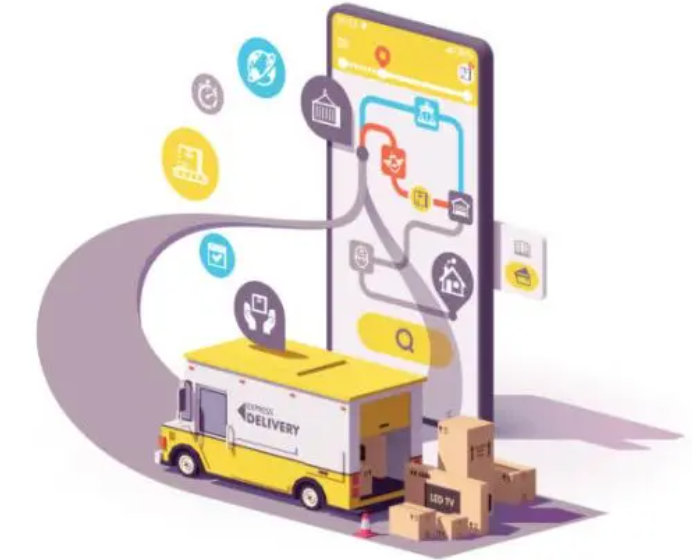4 mins | 1000 words
By: Jenn Campbell
A bad experience supplying a customer a few years ago gave Niek Van Dierdonck an idea for a new company. Now he’s at the helm of a scaling startup that offers logistics hardware and software as a solution.
The problem
When Niek Van Dierdonck was working for a European automotive company, he remembers his biggest challenge was always getting the goods to its customers. During one attempted delivery, one of his employees was distracted and failed to put a pallet on a truck, resulting in the empty-handed customer threatening to levy a large non-delivery penalty fee. Van Dierdonck chartered a helicopter to fly the products in question to his customer, keeping them happy and avoiding the fee.
The solution

That lesson stuck with him and in 2018, he founded a company called RedLore that would prevent such crises. His company designs and rents small Internet-of-Things devices that attach to pallets, packages and goods, and track their whereabouts. Had the automotive company had such technology, it would have known immediately that the palette with the time-sensitive delivery was languishing in a warehouse when it was supposed to be on a truck.
Van Dierdonck says the global economy is losing about $225 billion each year to such supply-chain inefficiencies, but now RedLore is here to help.
“We rent the devices out to our customers, so it’s a solution-as-a-service model,” Van Dierdonck says. “They just pay per device, per month and then they get access to dashboards where they can track their packages and see what conditions they’re in.”
RedLore designed and built the devices, but now it subcontracts production to an Ontario manufacturer. The devices can be customized for the client’s specific needs. It can tell, for example, whether a package has seen too many vibrations over the course of its delivery journey, or, as is the case with vaccine delivery, whether it’s maintained the right temperature the whole time.
RedLore is so named because the colour red signifies strength, power and passion, and lore refers to knowledge gained through study or experience, so it sums up the company’s mission to strengthen its customers’ supply chain through the insights that its patented Internet-of-Things and machine learning technology brings.
The growth
Just one year ago — in April 2020 — the nascent company had only two employees. Now it has six and it’s in the process of hiring three more. Revenues have almost doubled in a year.
“Had COVID not happened, I think the growth would have been quite a bit larger,” Van Dierdonck says. “Business hasn’t halted, but it’s definitely slowed to about 50 per cent of what it could have been without COVID. We’re still seeing growth, which we’re very happy about, but we always want to do the maximum we can and had COVID not happened, our existing customers would certainly have ordered more and taken their ordering decisions faster. A lot of companies — especially mid-last year — moved into a very conservative position investment and spending wise. Now that it has eased, and people understand there will be an end to the pandemic, business is very good.”
“E-commerce has meant everyone is ordering online so people are much more aware that our supply chains need to work flawlessly,” he says. “They have to be very fast and very affordable. That has made these companies much more aware that they need to invest in technology to help manage that. We haven’t seen the revenues from that, but I expect it’ll come in the next two years.”
The company has an impressive customer roster including Ottawa company, IMI, which is North America’s largest warehouse installation company.
“If Amazon built a new warehouse, IMI will send their people there to install conveyor belts and man forklifts. They have 3,000 people across North America,” Van Dierdonck explains.
AB InBev, the world’s largest brewer and a multinational drink company based in Van Dierdonck’s native Belgium, is also a customer. To illustrate his technology’s broad reach, Van Dierdonck also named Relogix, an Ottawa startup that’s currently in the scale-up program at Invest Ottawa and does workplace occupancy monitoring.
While the pandemic has slowed business overall, it has had a few silver linings for this company, chief among them the growing awareness of the importance of supply chains.
How Invest Ottawa helped
RedLore has been participating in Invest Ottawa’s accelerator program and Van Dierdonck says he can’t “overstate the value that Invest Ottawa” had for his company.
“It gives us access to a pool of experts and each one is a specialist in their field,” he says. “Whether it’s finance, strategy, sales — we have a pool of trusted advisers we can tap into. This type of expertise would be very expensive if we had to buy it. But not only that, it would also be hard to buy because most people aren’t interested in talking to companies like us.”
He says Invest Ottawa has been, so far, a “major factor” in his company’s success.
“I consider it almost a board of directors, plus plus,” he says.
Van Dierdonck has worked at companies in France, Belgium and Germany and says the kind of service Invest Ottawa offers is lacking in those countries. In Ottawa, he was also able to access the ENCQOR program’s 5G test bed.
“We were looking to integrate 5G into our products, but we didn’t know what 5G was going to bring us,” he says. “We wanted a quick and easy way to test it and it was very beneficial that ENCQOR had this technology that we could test at Bayview Yards. It confirmed to us that 5G had a substantial benefit for us.”
He says they were able to get a strong signal from inside a transport truck, which indicates much better connectivity through 5G.
“This allowed us to improve our competitiveness and our offering as a company,” Van Dierdonck says.
Soon, RedLore will launch a pilot with one of Canada’s largest refrigerated pharmaceutical transport companies with the new technology.







